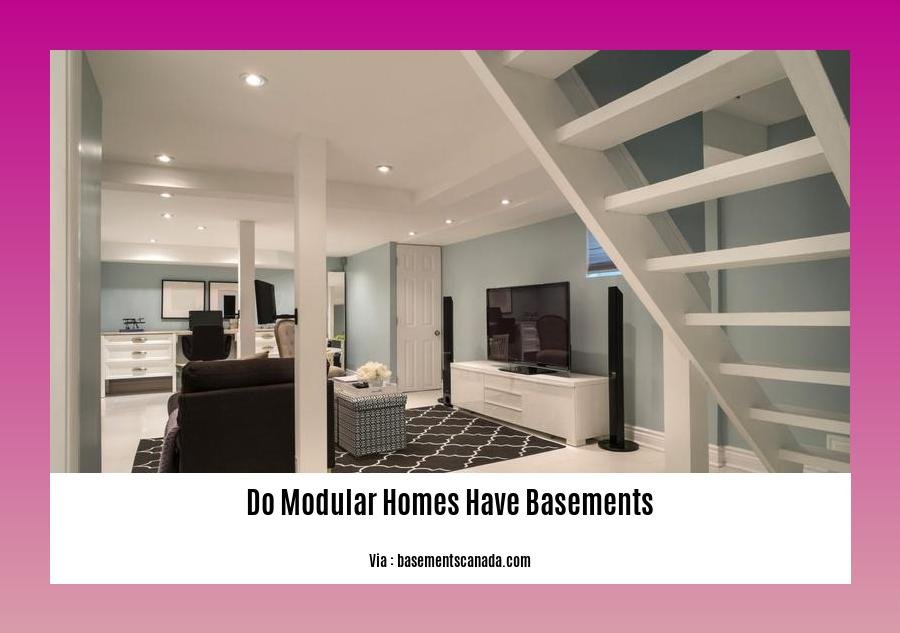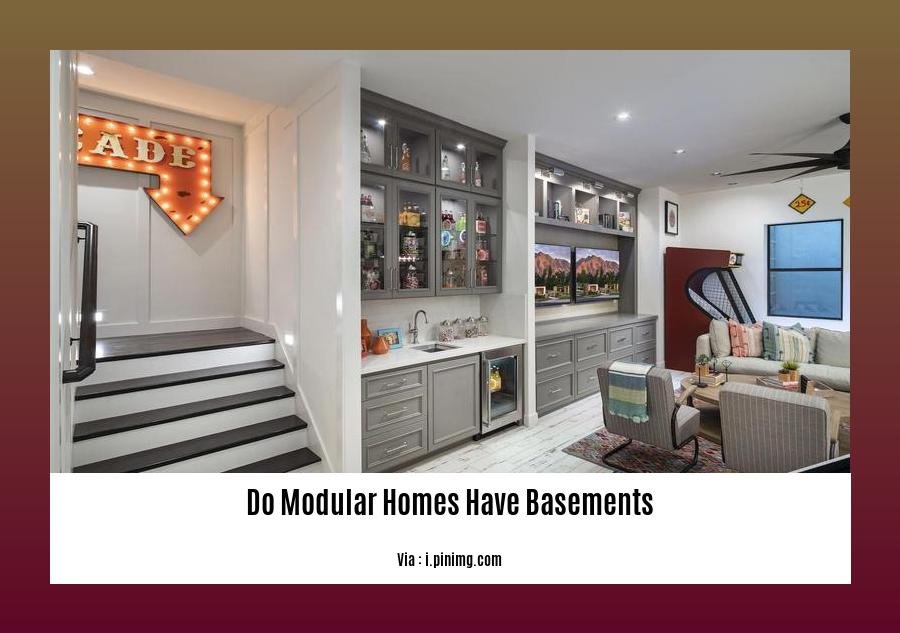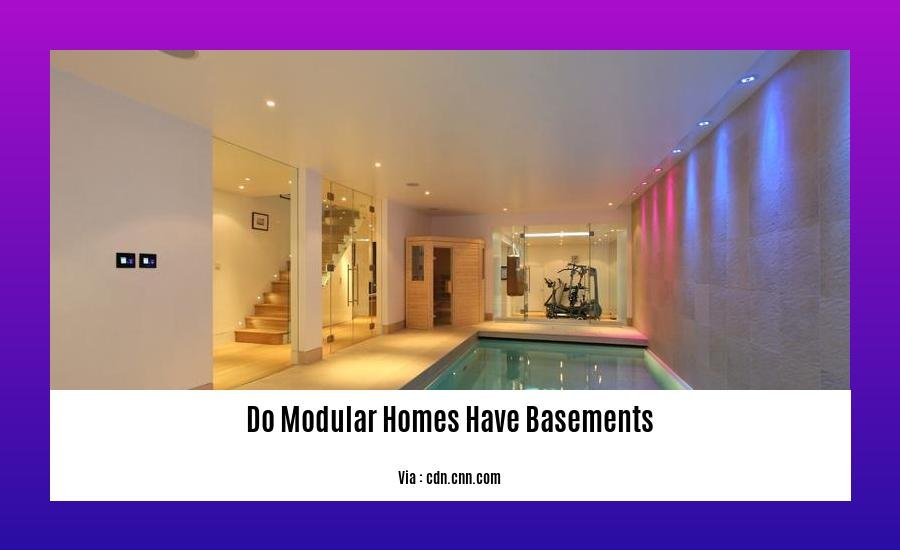Embark on a journey into the realm of modular homes and uncover the intriguing question: Do Modular Homes Have Basements? Unveiling the Possibilities and Limitations. Explore the unique considerations and opportunities associated with incorporating basements into these innovative structures. Discover how these modern construction methods can accommodate subterranean spaces, maximizing functionality while preserving aesthetic appeal.
Key Takeaways:
- Modular homes can be built on a basement foundation or a pier and beam system with a crawl space.
- The basement options for modular homes are similar to those available for any other type of construction.
- Adding a basement to a modular home costs around $20,000 to $29,000 on average.
- Basements can be used for various purposes, including game rooms, home movie theaters, or additional storage space.
- They can also increase the value of a home.
Do Modular Homes Have Basements?

Before we dive into the specifics of basements in modular homes, let’s address a common question: do modular homes have basements? The answer is a resounding yes! Modular homes offer the same foundational options as traditional on-site constructions, including basements. These basements can be customized to suit your needs and preferences, whether it’s a cozy rec room, a home theater, or simply extra storage space.
Choosing a basement for your modular home comes with several advantages:
- Increased space: A basement adds valuable square footage to your home, expanding your living area, especially if you’re working with a smaller footprint.
- Versatility: The basement can be designed to accommodate diverse needs, be it a home office, gym, guest room, or even a separate living space for extended family or guests.
- Energy efficiency: Basements provide an additional layer of insulation, helping regulate the home’s temperature and potentially reducing energy consumption.
- Home value: A basement can increase your home’s resale value, making it an investment that pays off in the long run.
However, there are also some factors to consider regarding basements in modular homes:
- Cost: Adding a basement can increase the overall cost of your modular home.
- Construction time: Basements require additional time for excavation and construction, potentially extending the overall timeline of your project.
- Access to natural light: Depending on the design, basements may have limited natural light, so consider incorporating additional windows or lighting solutions.
Now that we’ve explored the potential of basements in modular homes, let’s dive into the nitty-gritty:
How Much Does It Cost to Add a Basement to a Modular Home?
The cost of adding a basement to a modular home typically falls between $20,000 and $29,000, depending on the size and complexity of the design. This includes design fees, permits, excavation costs, and construction materials.
-
Looking to install a heating and cooling system in your mobile home? Discover the best heating and cooling system for mobile homes that meets your unique requirements.
-
Curious about whether manufactured homes come with basements? Find out the answer to this common question: Do manufactured homes have basements?
-
Wondering if modular homes retain their value over time? Explore the factors that determine does a modular home hold its value.
-
Considering integrating Blink with Apple HomeKit? Uncover the compatibility and potential benefits of using these devices together: Does Blink work with Apple HomeKit?
-
Planning for homeownership? Utilize our comprehensive home ownership cost calculator to estimate the financial responsibilities involved.
Advantages of Basement in Modular Homes
Have you always dreamt of having a basement in your home? Well, you can with modular homes! Modular homes offer the same basement options as traditional on-site constructions, allowing you to customize it to your needs and preferences, making it the perfect space for a home office, gym, guest room, separate living space, or anything else your heart desires!
There are several advantages to having a basement in your modular home:
-
Increased Living Space: Basements offer additional square footage, which is especially beneficial for modular homes with smaller footprints, providing more room to spread out and enjoy.
-
Versatility of Use: Whether you want a home office, gym, guest room, or separate living space, the basement can serve multiple purposes, accommodating your changing needs over time.
-
Energy Efficiency: Basements provide natural insulation, helping to regulate indoor temperatures and potentially reduce energy consumption, making it a cost-effective option.
-
Increased Home Value: A basement can increase the overall value of your modular home, making it a worthwhile investment that can pay off in the long run.
Important Considerations:
-
Additional Cost: Basement in modular homes typically cost more than homes without basements, so factor this expense into your budget.
-
Extended Construction Timeline: Excavating and constructing a basement can extend the construction timeline compared to homes without basements.
-
Limited Natural Light: Basements might have limited natural light, so plan for additional windows or lighting solutions to ensure a bright and inviting space.
Key Takeaways:
-
Modular homes offer a variety of basement options to suit your needs and preferences.
-
Basements provide additional living space, increased versatility, potential energy efficiency gains, and possibly increased home value.
-
Consider the additional cost, extended construction timeline, and limited natural light when opting for a basement in your modular home.
Citation:
Challenges of Basement in Modular Homes

Modular homes offer an array of possibilities when it comes to customization, including the option of incorporating a basement. While basements can provide additional living space and storage, they also pose unique challenges that prospective homeowners should consider.
Key Takeaways:
-
Building Permits: Local building codes and regulations may restrict or prohibit the construction of basements in certain areas. Obtaining the necessary permits and ensuring compliance can be a time-consuming and complex process.
-
Site Preparation: Installing a basement requires excavation and proper site preparation, which can be challenging in areas with rocky or uneven terrain. This can lead to increased costs and potential delays during construction.
-
Water Management: Basements are susceptible to moisture and water seepage, especially in areas with high water tables or prone to flooding. Ensuring proper drainage and waterproofing is crucial to prevent water damage and maintain the integrity of the structure.
-
Construction Complexity: Adding a basement to a modular home involves additional structural considerations and engineering expertise. This can result in a more complex and time-consuming construction process compared to modular homes without basements.
-
Cost Implications: Building a basement typically incurs higher costs than constructing a modular home without one. Factors such as excavation, foundation work, and waterproofing contribute to the increased expense.
-
Limited Natural Light: Depending on the design and layout, basements may have limited access to natural light, creating a darker and less inviting space. Proper lighting solutions and strategic placement of windows can help mitigate this issue.
-
Structural Considerations: Basements require careful attention to structural integrity, especially in areas prone to seismic activity or extreme weather conditions. Ensuring the basement is properly supported and reinforced is essential for the overall stability of the modular home.
Despite these challenges, basements in modular homes can offer several advantages, including increased living space, additional storage, and potential resale value. Working with experienced modular home builders and addressing these challenges effectively can lead to a successful and enjoyable basement experience in a modular home.
[Relevant URL Sources]
– Can a Modular Home Have a Basement? | Design. Build. Modular:
– Modular Homes with Basements: A Comprehensive Guide:
Cost of Adding Basement
In considering modular homes, questions naturally arise about the possibilities of adding a basement. Modular homes can indeed have basements, offering multiple benefits while introducing unique considerations regarding costs and feasibility.
Key Takeaways:
-
Modular homes offer basement options with similar versatility to traditional constructions.
-
Basements provide additional living space, increased storage options, and potential value appreciation.
-
Cost of Adding Basement:
- Depends on the size, type of basement, and location:
- Typical cost ranges from $10 to $100 per square foot.
- Can add $26,000 to $80,000 to the overall project cost.
Benefits of Basements in Modular Homes:
-
Enhanced Living Space: Suitable for homes with limited footprints, basements provide extra square footage for various uses.
-
Multipurpose Functionality: Basements offer versatile spaces for home offices, entertainment rooms, guest suites, or additional bedrooms.
-
Energy Efficiency: Additional insulation in basements can enhance energy efficiency, leading to potential savings on utility bills.
-
Increased Resale Value: Basements add value to a home, making it more attractive to potential buyers and increasing resale value.
Considerations for Basements in Modular Homes:
-
Additional Costs: Basements typically add to the overall project cost compared to homes without basements.
-
Extended Construction Time: Building a basement requires excavation and construction, potentially extending the construction timeline.
-
Limited Natural Light: Basements may lack ample natural light, necessitating additional lighting or windows for a brighter space.
Factors Influencing Basement Costs:
-
Size and Design: Larger basements with intricate designs will generally cost more than smaller, simpler ones.
-
Location and Soil Conditions: Local construction costs, soil conditions, and water table levels affect overall expenses.
-
Finishing Level: Unfinished basements are more economical than fully finished ones, which include flooring, wall coverings, and fixtures.
Conclusion:
Modular homes with basements offer advantages in terms of space, functionality, energy efficiency, and resale value. However, careful consideration of cost, construction time, and natural light factors is essential when making this decision. Consulting with experts in modular home construction can provide valuable insights and help navigate the complexities of adding a basement to your modular home.
Citation:
[1] Can Modular Homes Have Basements? Options Explained (https://prefabie.com/modular-homes-basements/)
[2] Can You Put A Basement Under A Mobile Home? (
FAQ
Q1: Can All Modular Homes Have Basements?
A1: Not necessarily, the feasibility of having a basement in a modular home depends on various factors such as local building codes, soil conditions, and the water table level. It’s crucial to consult with professionals to assess the suitability of a basement for a specific modular home project.
Q2: What Are the Advantages of Having a Basement in a Modular Home?
A2: Basements in modular homes provide additional living space, which can be utilized for various purposes such as game rooms, home theaters, or storage areas. Additionally, basements can increase the overall value of the home and offer a safe and functional space.
Q3: How Much Does It Cost to Build a Basement in a Modular Home?
A3: The cost of constructing a basement in a modular home typically ranges from $20,000 to $100,000, depending on factors like the size, type of basement, and location of the property. It’s important to consider the additional expenses associated with design, permits, excavation, construction, and finishing costs.
Q4: Are There Different Types of Basements for Modular Homes?
A4: Yes, there are various types of basements available for modular homes. These include fully underground structures with no windows, partially underground spaces with windows or doors, and walkout basements that provide direct access to the outdoors. The selection of the basement type depends on personal preferences, local regulations, and the specific design requirements of the modular home.
Q5: What Considerations Should Be Made When Planning a Basement for a Modular Home?
A5: When planning a basement for a modular home, it’s essential to consider factors such as local building codes, soil conditions, and the water table level. Additionally, aspects like the size and layout of the basement, as well as the intended purpose and desired features, should be taken into account. Consulting with professionals, including builders, contractors, and local authorities, is crucial to ensure proper design, construction, and compliance with regulations.
- Dora the Explorer Wipe-Off Fun: Safe & Mess-Free Activities for Little Explorers - April 18, 2025
- Does Lemongrass Repel Mosquitoes? Fact vs. Fiction + How to Use It - April 18, 2025
- Do Woodchucks Climb Trees?Fact vs. Fiction - April 18, 2025










